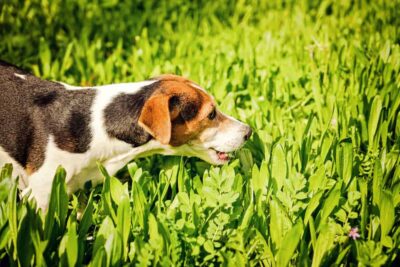It’s not uncommon to see dogs grazing on grass occasionally, but have you ever seen a dog eating grass frantically? This behavior can concern pet owners, indicating an underlying health issue. In this article, we will explore why dogs may eat grass frantically and what steps can be taken to address this behavior. So, whether you’re a concerned pet owner or simply curious about this behavior, read on to learn more.
Dogs that eat grass frantically may be experiencing an underlying gastrointestinal disorder. Gastrointestinal disorders can cause dogs to experience nausea, vomiting, and diarrhea, leading to dogs eating grass to alleviate their symptoms. If this is the case, a veterinarian can perform diagnostic tests and provide treatment to relieve the dog’s symptoms.
Another thing to consider is the dog’s diet; if the dog is eating grass and vomiting, it could be that they are not getting enough nutrients from its diet. A veterinarian can recommend a diet to give the dog the necessary nutrients.
Finally, it’s important to remember that not all grass-eating is problematic. Some dogs enjoy the taste of grass and graze on it occasionally without any issues. If the dog is otherwise healthy and happy and shows no other signs of distress, taking action may not be necessary.
Dog eating grass frantically.
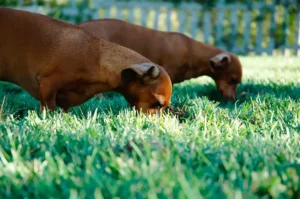
Eating grass frantically is unusual for dogs and can be concerning for pet owners. This behavior is also known as “grass eating” or “pica,” defined as consuming non-food items.
One of the most common reasons dogs eat grass is to induce vomiting when they have an upset stomach or indigestion or to help them pass something they shouldn’t have eaten. If a dog is experiencing stomach troubles, it may instinctively eat grass to alleviate the discomfort. This behavior is often referred to as “grazing,” and it’s not always a cause for concern.
Another possible reason for grass eating is nutritional deficiencies. Some dogs may eat grass if they lack specific vitamins or minerals. In this case, adjusting the dog’s diet may be the solution.
Boredom and stress can also be a reason why dogs eat grass. Eating grass can signify boredom or stress in dogs, as they may be looking for something to do or a way to cope with their emotions. In these cases, providing more mental and physical stimulation, such as interactive toys, games, and long walks, can help alleviate the behavior.
Medical conditions such as anemia or other gastrointestinal issues can also be a reason why dogs eat grass frantically. In these cases, it’s best to consult with a veterinarian, as they can perform a physical examination and rule out any underlying medical conditions that may be causing the behavior.
Why does my dog eat grass frantically?
There can be several reasons why a dog may eat grass frantically. Some of the most common causes include the following:
1. Stomach troubles: Dogs may eat grass to induce vomiting when they have an upset stomach or indigestion or to help them pass something they shouldn’t have eaten.
2. Nutritional deficiencies: Some dogs may eat grass without specific vitamins or minerals.
3. Boredom or stress: Eating grass can signify dogs’ boredom or stress.
4. Medical conditions: Some conditions can cause a dog to eat grass frantically, such as anemia or other gastrointestinal issues.
It’s important to note that eating grass does not cause harm to most dogs, and some dogs may even eat grass as normal behavior. However, suppose your dog is eating grass frantically and showing other signs of distress, such as vomiting, diarrhea, lethargy, or weight loss. In that case, it’s best to consult your veterinarian as soon as possible.
Is it normal for dogs to eat grass frantically?

Eating grass frantically is not considered normal behavior for dogs. While some dogs occasionally graze on grass, eating grass frantically and in large amounts is not typical. This behavior can signify an underlying health issue or a behavioral problem. Note that grass eating is not harmful to most dogs, and some dogs may even eat grass as a normal behavior.
However, suppose your dog is eating grass frantically and showing other signs of distress, such as vomiting, diarrhea, lethargy, or weight loss. In that case, it’s best to consult your veterinarian as soon as possible. They can perform a physical examination and rule out any underlying medical conditions that may be causing the behavior. They can also guide how to address the behavior and ensure your pet stays healthy.
It’s essential to keep an eye on your dog’s behavior. If you notice any unusual eating habits or if they persist, it’s best to consult your veterinarian for professional advice.
How to stop a dog from eating grass frantically?
Here are a few steps you can take to help stop a dog from eating grass frantically:
1. Consult with a veterinarian: The first step in addressing this behavior is to consult a veterinarian. They can perform a physical examination and rule out any underlying medical conditions that may be causing the behavior.
2. Address any nutritional deficiencies: If your veterinarian determines that your dog lacks specific vitamins or minerals, it may recommend adjusting its diet to address these deficiencies.
3. Provide mental and physical stimulation: Boredom and stress can also be why dogs eat grass. Provide your dog with interactive toys, games, and longer walks to alleviate the behavior.
4. Limit access to grass: If you can’t eliminate the grass your dog is eating, you can limit your dog’s access to it by fencing off the area or keeping your dog on a leash when you’re outside.
5. Use positive reinforcement: Reward your dog with treats, praise, or playtime when they don’t engage in the behavior.
6. Consult with a professional behaviorist: If the problem persists, consult with an experienced dog behaviorist who can help identify the underlying cause of the behavior and provide guidance on how to address it.
It’s important to note that these steps are not a guarantee that the behavior will stop, but they can certainly help to reduce or eliminate it.
Can eating grass frantically be a sign of a health problem in dogs?
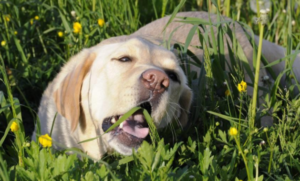
Eating grass frantically can indicate an underlying health problem in dogs. Some of the most common health issues that can cause this behavior include:
1. Gastrointestinal disorders: Dogs who eat grass frantically may be experiencing an underlying gastrointestinal disorder. Gastrointestinal disorders can cause dogs to experience nausea, vomiting, and diarrhea, leading to dogs eating grass to alleviate their symptoms.
2. Nutritional deficiencies: Some dogs may eat grass without specific vitamins or minerals.
3. Anemia: Dogs with anemia may eat grass to supplement their iron intake.
4. Parasites: Dogs with intestinal parasites may eat grass to alleviate symptoms such as itching and discomfort.
5. Medical conditions: Other medical conditions such as diabetes, liver or kidney disease, or cancer can also cause dogs to eat grass frantically.
If your dog is eating grass frantically and also showing other signs of distress, such as vomiting, diarrhea, lethargy, or weight loss,
What types of grass are safe for dogs to eat?
Most types of grass are safe for dogs to eat and can be a natural source of fiber, but it’s important to note that some types of grass and plants can be toxic to dogs.
Here are a few types of grass that are considered safe for dogs to eat:
1. Bermuda grass: This type of grass is commonly found in lawns and is safe for dogs to eat.
2. Ryegrass: This type of grass is commonly used for landscaping and is also considered safe for dogs to eat.
3. Fescue grass: This type of grass is commonly found in lawns and pastures and is considered safe for dogs to eat.
4. Bluegrass: This grass is commonly found in lawns and pastures and is considered safe for dogs to eat.
It’s important to note that the safety of grass can vary depending on the location and the specific species of grass. It’s also important to remember that just because the grass is safe for dogs to eat, it doesn’t mean that they should eat it all the time, especially if they are eating it frantically.
How much grass is safe for dogs to eat?
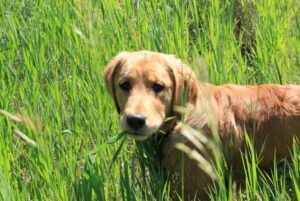
Eating grass is not harmful to most dogs, and some dogs may even eat grass as a normal behavior, but eating grass in large amounts can cause stomach upset and vomiting. In general, it’s safe for dogs to occasionally eat small amounts of grass, as it can provide them with some fiber and other nutrients.
However, it’s important to note that the safety of grass can vary depending on the location, the specific species of grass, and the dog’s health.
It’s also important to keep an eye out for any pesticides, fertilizers, or other chemicals that may have been used on the grass, as they can be harmful to dogs if ingested.
Can eating grass frantically cause diarrhea in dogs?
Eating grass frantically can cause diarrhea in dogs and other gastrointestinal issues. This can occur for a few reasons:
1. Inducing vomiting: Dogs may eat grass to induce vomiting when they have an upset stomach or indigestion or to help them pass something they shouldn’t have eaten. However, this process can cause diarrhea as well as stomach upset.
2. Gastrointestinal irritation: Eating large amounts of grass can also irritate the dog’s gastrointestinal tract, leading to diarrhea.
3. Toxicity: Some types of grass can be toxic to dogs and cause severe health problems if consumed in large amounts, including diarrhea.
4. Parasites: Dogs with intestinal parasites may eat grass to alleviate symptoms such as itching and discomfort. This can also cause diarrhea.
If your dog is experiencing diarrhea after eating grass, it’s best to consult your veterinarian as soon as possible. They can perform a physical examination and rule out any underlying medical conditions that may be causing the behavior. They can also guide how to address the behavior and ensure your pet stays healthy.
Can eating grass frantically cause vomiting in dogs?

Eating grass frantically can cause vomiting in dogs. This can occur for a few reasons:
1. Inducing vomiting: Dogs may eat grass to induce vomiting when they have an upset stomach or indigestion or to help them pass something they shouldn’t have eaten. The grass can stimulate the dog’s gag reflex and cause them to vomit.
2. Gastrointestinal irritation: Eating large amounts of grass can also irritate the dog’s gastrointestinal tract, leading to vomiting.
3. Toxicity: Some types of grass can be toxic to dogs and cause severe health problems if consumed in large amounts, including vomiting.
4. Parasites: Dogs with intestinal parasites may eat grass to alleviate symptoms such as itching and discomfort. This can also cause vomiting.
Can eating grass frantically cause stomach upset in dogs?
Eating grass frantically can cause stomach upset in dogs. Eating large amounts of grass can irritate the dog’s gastrointestinal tract, leading to stomach upset, vomiting, and diarrhea.
Also, if the dog is eating grass to induce vomiting, this process can cause stomach upset. Furthermore, if the grass is contaminated with pesticides, fertilizers, or other chemicals, it can cause stomach upset.
In addition, if the dog has an underlying medical condition such as anemia, gastrointestinal disorders, or other illnesses, eating grass frantically can exacerbate the symptoms and cause stomach upset.
How to tell if a dog’s eating grass frantically is a behavioral or medical issue?
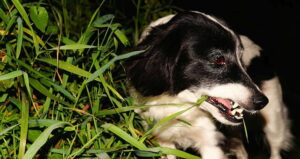
It can be challenging to determine if a dog’s eating grass frantically is a behavioral or medical issue. Here are a few things to consider helping determine the cause:
1. Observe the behavior: Pay attention to the dog‘s behavior when they are eating grass. Are they eating large amounts of grass or just grazing occasionally? Are they showing signs of distress, such as vomiting, diarrhea, or lethargy? Is the behavior consistent, or does it come and go?
2. Check for other symptoms: Look for other signs that may indicate a medical issue, such as weight loss, loss of appetite, or changes in behavior.
3. Consider the dog’s diet: If the dog is eating grass frantically and showing other signs of distress, such as vomiting, diarrhea, or weight loss, it could be a sign of a nutritional deficiency in their diet.
4. Consult with a veterinarian: The best way to determine if a dog’s eating grass frantically is a behavioral or medical issue is to consult a veterinarian. They can perform a physical examination and rule out any underlying medical conditions that may be causing the behavior. They can also guide how to address the behavior and ensure your pet stays healthy.
5. Consult with a behaviorist: If the veterinarian does not find any medical issues, consulting with a professional dog behaviorist can help identify the underlying cause of the behavior and provide guidance on how to address it.
Can eating grass frantically be a symptom of a nutritional deficiency in dogs?
Eating grass frantically can be a symptom of a nutritional deficiency in dogs. If a dog lacks specific vitamins or minerals, it may eat grass to supplement its nutrient intake.
For example, if a dog is deficient in iron, it may eat grass to help with its anemia symptoms. Additionally, if a dog is deficient in certain essential amino acids, it may eat grass to compensate for it. Not all dogs who eat grass apparently suffer from nutritional deficiencies, and some may eat grass as normal behavior.
However, suppose the dog is eating grass frantically and showing other signs of distress, such as vomiting, diarrhea, or weight loss. In that case, it’s best to consult your veterinarian to rule out any underlying medical conditions, including nutritional deficiencies. They can also guide how to address the behavior and ensure your pet stays healthy.
How to determine if eating grass frantically is a symptom of a parasite infestation in dogs?
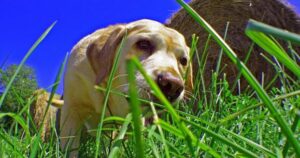
Eating grass frantically can be a symptom of a parasite infestation in dogs. Here are a few things to consider helping determine if your dog has a parasite infestation:
1. Observe the behavior: Pay attention to the dog’s behavior when they are eating grass. Are they eating large amounts of grass or just grazing occasionally? Are they showing signs of distress, such as vomiting, diarrhea, or lethargy?
2. Check for other symptoms: Look for other signs that may indicate a parasite infestation, such as weight loss, loss of appetite, anemia, or changes in behavior.
3. Check for visible signs of parasites: Check your dog’s coat, skin, and feces for visible signs of parasites such as fleas, ticks, or worms.
4. Consult with a veterinarian: The best way to determine if a dog’s eating grass frantically is a symptom of a parasite infestation is to consult a veterinarian. They can perform a physical examination and run diagnostic tests such as fecal examination to check for the presence of parasites. They can also guide how to address the behavior and ensure your pet stays healthy.
How to prevent a dog from eating grass frantically?
Here are a few steps you can take to help prevent a dog from eating grass frantically:
1. Provide a balanced diet: Ensure your dog is getting all the necessary nutrients and vitamins they need through a balanced diet. Consult with your veterinarian for advice on the best diet for your dog.
2. Provide mental and physical stimulation: Boredom and stress can also be why dogs eat grass. Provide your dog with interactive toys, games, and longer walks to alleviate the behavior.
3. Limit access to grass: If you can’t eliminate the grass your dog is eating, you can limit your dog’s access to it by fencing off the area or keeping your dog on a leash when you’re outside.
4. Use positive reinforcement: Reward your dog with treats, praise, or playtime when they don’t engage in the behavior.
5. Regular veterinary check-ups: Regular veterinary check-ups can help identify and treat any underlying medical conditions that may be causing the behavior.
6. Consult with a professional behaviorist: If the problem persists, consult with an experienced dog behaviorist who can help identify the underlying cause of the behavior and provide guidance on how to address it.
7. Keep an eye on the grass: Keep an eye on the grass that your dog is eating, and make sure it’s not contaminated with pesticides, fertilizers, or other chemicals that may have been used on the grass, as they can be harmful to dogs if ingested.
Is eating grass frantically a sign of boredom or anxiety in dogs?
Eating grass frantically can be a sign of boredom or anxiety in dogs. B bored or anxious dogs may engage in repetitive behaviors, such as eating grass, to cope with their emotions. This can be seen as a coping mechanism to alleviate stress or anxiety.
Boredom can result from a lack of physical and mental stimulation, exercise, or companionship. It can manifest in dogs as destructive behaviors, excessive barking, or even eating grass.
Anxiety can be caused by various factors such as separation, environmental changes, or a lack of socialization. It can manifest in dogs as destructive behaviors, excessive barking, or even eating grass.
However, not all dogs who eat grass are bored or anxious. Some may eat grass as normal behavior; however, if the dog is eating grass frantically and shows other signs of distress, such as vomiting, diarrhea, or weight loss.
Conclusion
In conclusion, eating grass frantically can be expected for some dogs, while for others, it can be a sign of an underlying health problem or a behavioral issue. Some of the most common health issues that can cause this behavior include gastrointestinal disorders, nutritional deficiencies, anemia, parasites, and other medical conditions.
Suppose your dog eating grass frantically and also showing other signs of distress, such as vomiting, diarrhea, or weight loss. In that case, it’s best to consult your veterinarian as soon as possible. They can perform a physical examination and rule out any underlying medical conditions that may be causing the behavior.
It’s also important to remember that eating grass frantically can also be a symptom of boredom or anxiety in dogs. Providing them with mental and physical stimulation and addressing any underlying anxiety issues can help alleviate this behavior.
To prevent your dog from eating grass frantically, you can provide a balanced diet, mental and physical stimulation, and limit access to grass.
In addition, use positive reinforcement, and keep an eye on the grass to ensure it’s not contaminated with pesticides, fertilizers, or other chemicals.

